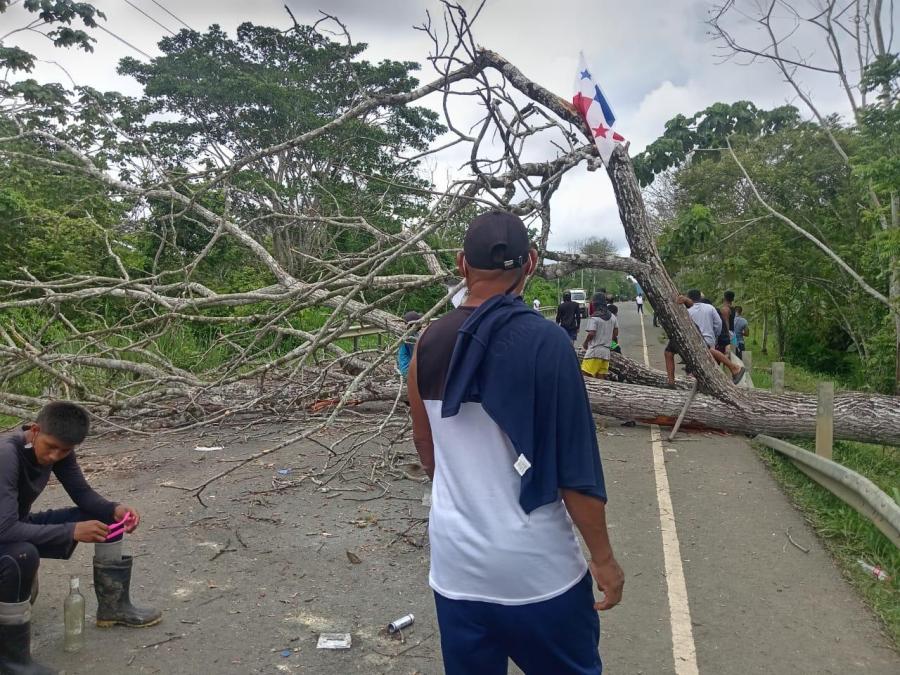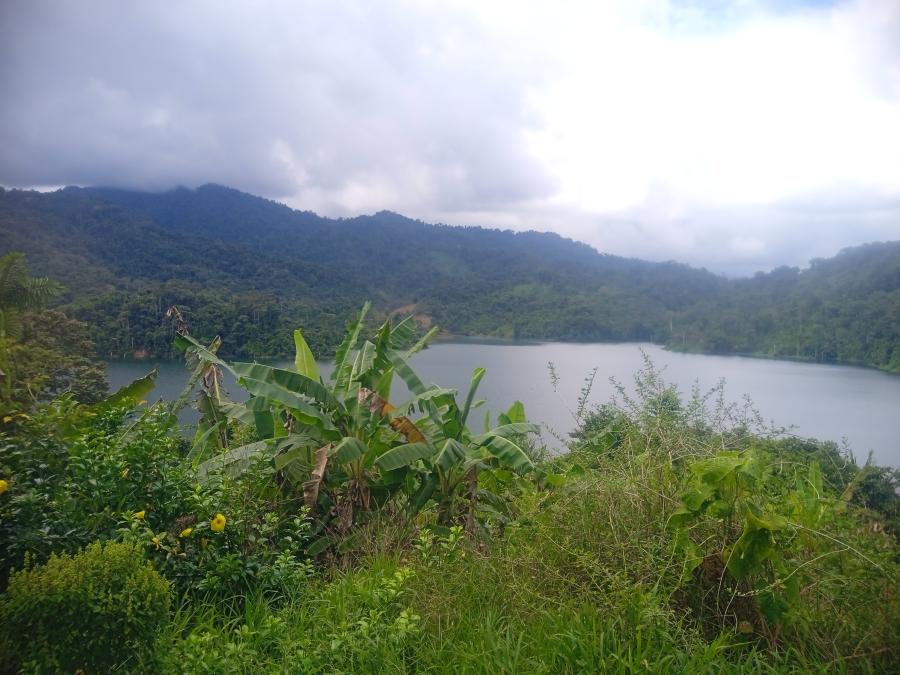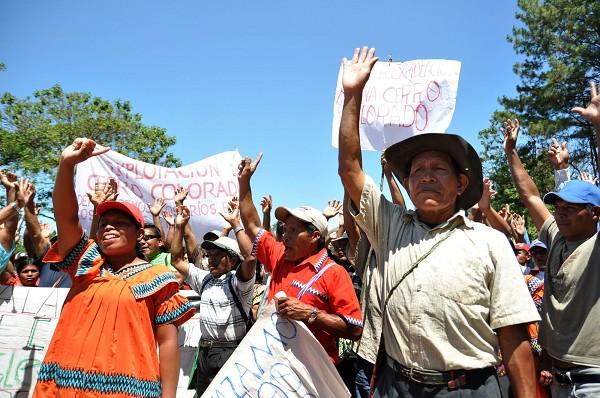
Originally posted on Intercontinental Cry
By Robin Llewellyn
The Ngäbe and Buglé peoples are holding protests today to highlight the Panamanian government's non-compliance with peace accords that ended last year's deadly protests. Activists and leaders of the Ngäbe-Buglé Comarca in western Panama claim the state has failed to compensate victims of police violence, and has allowed the continued construction of the Barro Blanco hydroelectric dam which will drown Ngäbe communities and farmland along the Tabasara River. The date is symbolic, marking the anniversary of protests held in 1964 against the US occupation of the Canal Zone, which were also dispersed with deadly force.
A long awaited UN inspection report on the Barro Banco project, its compilation itself a part of the peace accords, was published in late December. The report rejects the main arguments of GENISA, the company behind the dam, by corroborating the claims by indigenous riverside communities that they depend on the Tabasara and its farmland for their livelihoods.
The Barro Blanco dam is currently being constructed day and night, despite the opposition of the Ngäbe communities that would be deprived of their land and homes by the floodwaters, and despite an ongoing challenge in the courts.
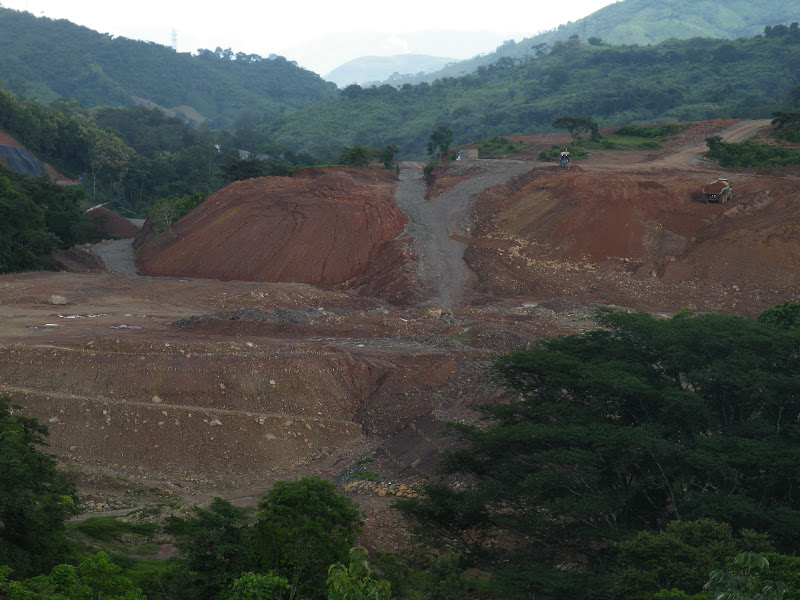 Dam under construction 24 hours a day.
Dam under construction 24 hours a day.
"The Panamanian Constitution protects the collective land of indigenous peoples, that's why any agreement has to involve the free, prior and informed consent of those affected by Barro Blanco... [but] the current practice of our government is to impose, not to negotiate or consult beforehand." says Felix Wing, the lawyer leading the appeal. He adds that "We have noticed an ethnic bias in government decisions that have to do with indigenous peoples by public institutions, by government agencies, and in particular with the [use of] public force – the police have reacted with more violence against indigenous peoples, for instance during the [2012] demonstrations, than they would against other groups."
GENISA is a Honduran-owned conventional and alternative energy company. It's website claims that the Barro Blanco project "does not require resettlement, or have human or commercial involvement in the district of Tolé, much less within the Ngäbe Buglé" area. GENISA's Panamanian spokesperson is Julio Lasso. He says the dam "has been developed, and is currently being implemented, pursuant to the laws of the Republic of Panama and in compliance with the Equator Principles and IFC performance standards".
The wooden houses along the Tabasara River carry slogans of "NO A LA REPRESA", painted in opposition to the dam that would swamp many of them, along with schools, cemeteries, and the richest farmlands. Italo Jimenez is president of the M-10 (Movimento 10 de Abril) indigenous protest movement that has fought the dam; he says the project will transform the Tabasara from a fast-flowing river abundant in fish, into an expanse of still water producing disease carrying mosquitoes.
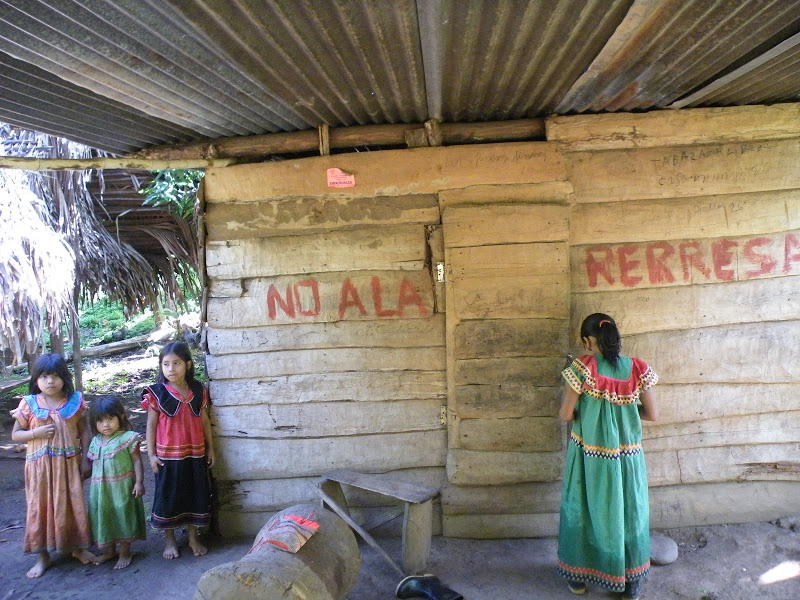 No a la represa - No to the dam. Photo Robin Oisín Llewellyn
No a la represa - No to the dam. Photo Robin Oisín Llewellyn
The UN report documents the cultural value of sites which would be drowned by the project. The valley is home to boulders carved with petroglyphs that the Ngäbes used to recreate their written language, and that have an eminent role in the Mamatata religion which spurred the revival of indigenous culture in the area. The M-10 movement is strongly influenced by Mamatata, and its members describe how the villager Manolo Miranda prayed beneath a zapoté tree below the community of Kiad in 1972, and received the meaning of three of the petroglyphs. With the knowledge of these three, the community succeeded in decoding the others and Kiad has since established a school teaching the reborn written language.
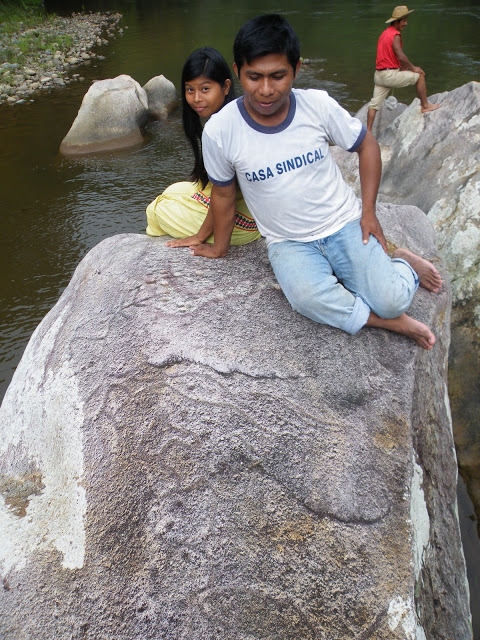 Schoolteacher Manolo Miranda by petroglyphs on the third boulder.
Schoolteacher Manolo Miranda by petroglyphs on the third boulder.
The Barro Blanco project is being financed by German investment bank DEG and Dutch national development finance organisation FMO. The Netherlands is one of only four European states to have ratified ILO Convention 169, which asserts that indigenous peoples have the right to exercise free, prior, and informed consent over developments on their land.
When asked how FMO assesses the level of support for the Barro Blanco project in the Tabasara valley, FMO's Paul Hartogsveld replied that: "FMO has assigned independent experts to monitor the project."
The independent expert is Mauricio Inostroza of the Hatchconsultancy, who also works on behalf of DEG in relation to Barro Blanco. When asked whether he would be advising DEG and FMO that the indigenous inhabitants of the Tabasara valley had withheld their free, prior and informed consent to Barro Blanco, he responded: "We have not been retained to speak to the media on behalf of our client, DEG & FMO. Our mandate is to provide technical expertise in case IFC Standards, to the development of Panama's Barro Blanco Hydroelectric project. We suggest you contact DEG & FMO for comment."
Over recent years indigenous areas of Panama have been made subject to a wave of hydroelectric dam construction, coinciding with the development of carbon trading systems and the building of the Mesoamerican electricity grid. In 2008, Panamanian environmental NGO the Alliance for Conservation and Development (ACD) persuaded the Inter-American Human Rights Commission to order the suspension of construction at the Chan-75 dam site in Bocas del Toro province, arguing that it violated national and international law by not seeking the free, prior and informed consent of the indigenous people who would be displaced. The Panamanian government ignored the ruling and later argued successfully in the Inter-American Court that the project would not negatively impact any communities as it had already been completed. The relationship between Panama's Martinelli administration and the country's indigenous peoples was thrown into stark relief when an Al-Jazeera film crew filmedthe flooding of indigenous land while the indigenous inhabitants were still in their homes, not having been warned of the decision.
ACD director Osvaldo Jordan, said "It's not just a problem of the Martinelli government, all these other dams were approved before him. It's a problem of our political class, which believes that progress is above people, which is nonsensical."
Speaking prior to the publishing of the UN report on Barro Blanco, Jordan warned that: "The Ngäbe position is going to be strengthened, however the construction has continued in spite of the report not being released and analyzed. That's where the UN mediation weakens, because if you could effectively stop [the construction of the dam] and protect the victims then it makes a lot of sense, but if you are buying up time for the company, and if the report says, 'Yes, more people are effected than originally thought, but by then the structure is well advanced...', then what's the purpose? And that's one of the issues that has created desperation with the Ngäbe."
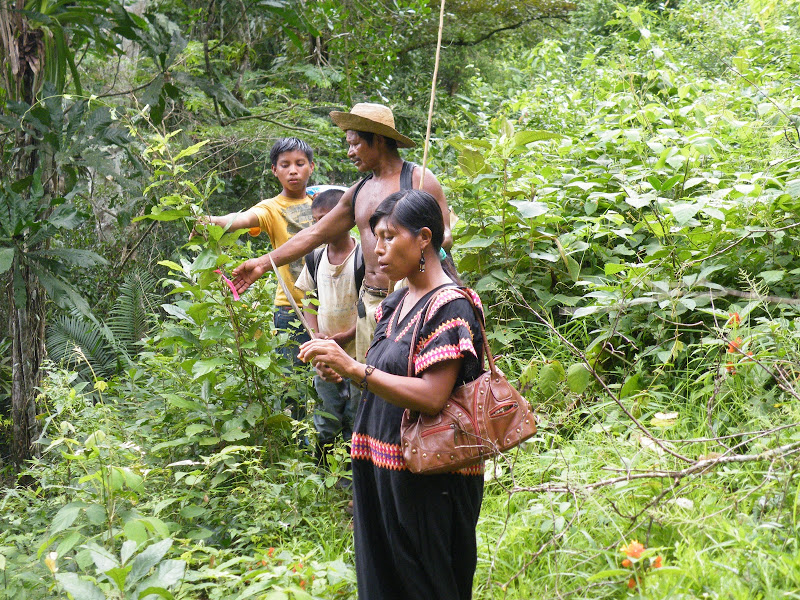 Italo Jiminez holds a pink tab placed by UN inspectors, marking the operating level of water if the Barro Blanco dam is completed.
Italo Jiminez holds a pink tab placed by UN inspectors, marking the operating level of water if the Barro Blanco dam is completed.
Last February's indigenous protests closed the Inter-American Highway before the Government stormed the demonstrators, killing Mauricio Méndez, Jerónimo Rodríguez Tugrí, and Franklin Javilla. Other protestors suffered life-changing injuries but still await state compensation. Ngäbe activist Weni Begamapresented evidence of Police brutality to the Inter American Commission for Human Rights in Washington: "There were women who were arrested and raped, even men as well; physically all their rights were violated." she says. Bergama urged Dutch and German citizens to ask FMO and DEG to withdraw their financing for Barro Blanco, and urged the organizations themselves to reevaluate their investments.
Today the Cacica General Silvia Carrera will participate in a march organized by M10 through the town of Tolé, 10 km from the Barro Blanco project site to demand a halt in construction so an independent verification panel can conduct a study of the environmental, cultural, social, and economic impacts of a dam. M-10 president Italo Jimenez has asked the international community to monitor how the Panamanian government polices such demonstrations, knowing that the Ngäbe-Buglé community has already paid dearly for protesting international investments on indigenous land.
[[{"type":"media","view_mode":"full","fid":"61159","attributes":{"alt":"","class":"media-image media-image-left","height":"600","style":"width: 100px; height: 100px; float: left;","width":"600"}}]]See Cultural Survival's campaign for more info:
Panama: Revoke Repressive Laws
